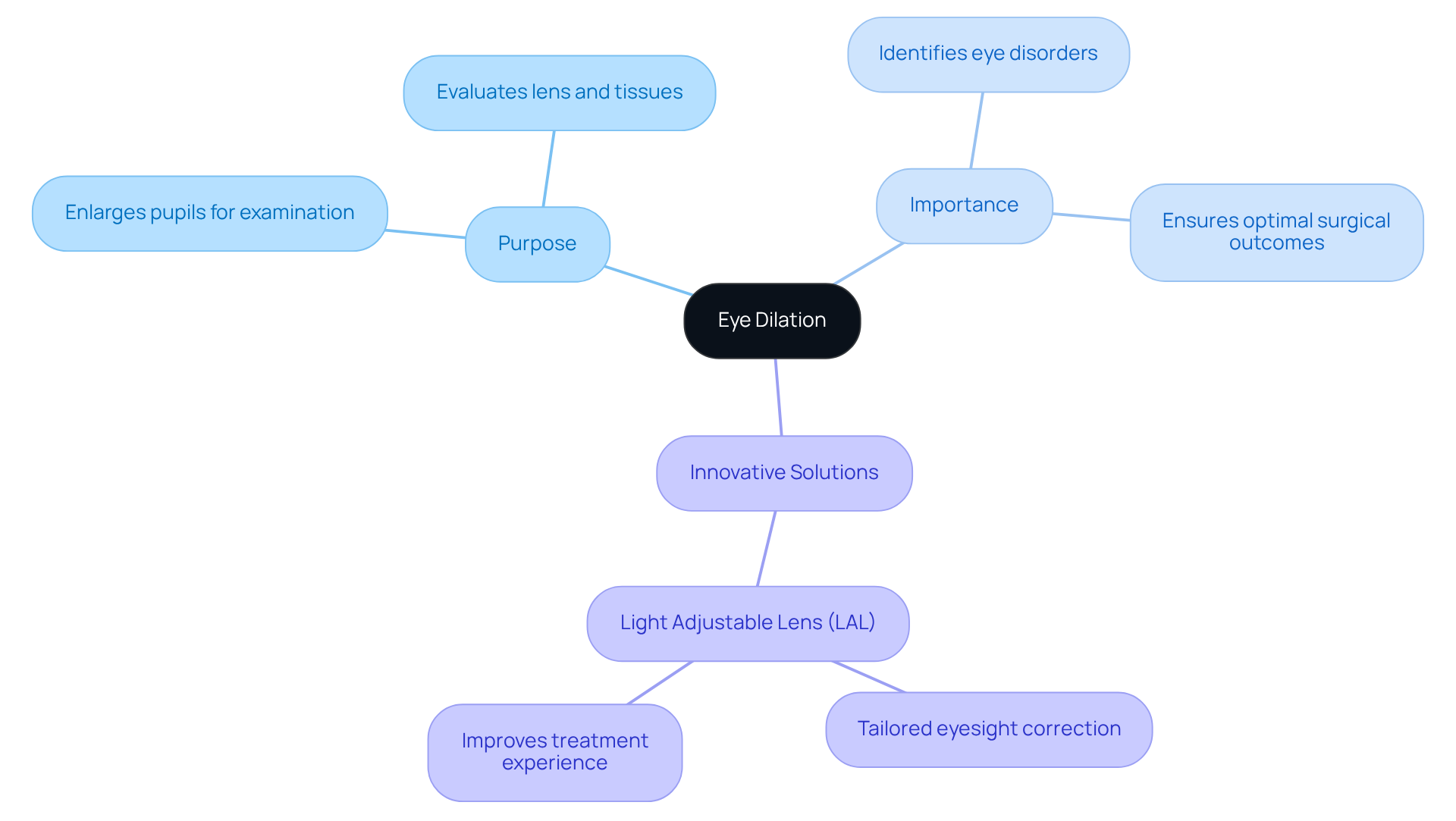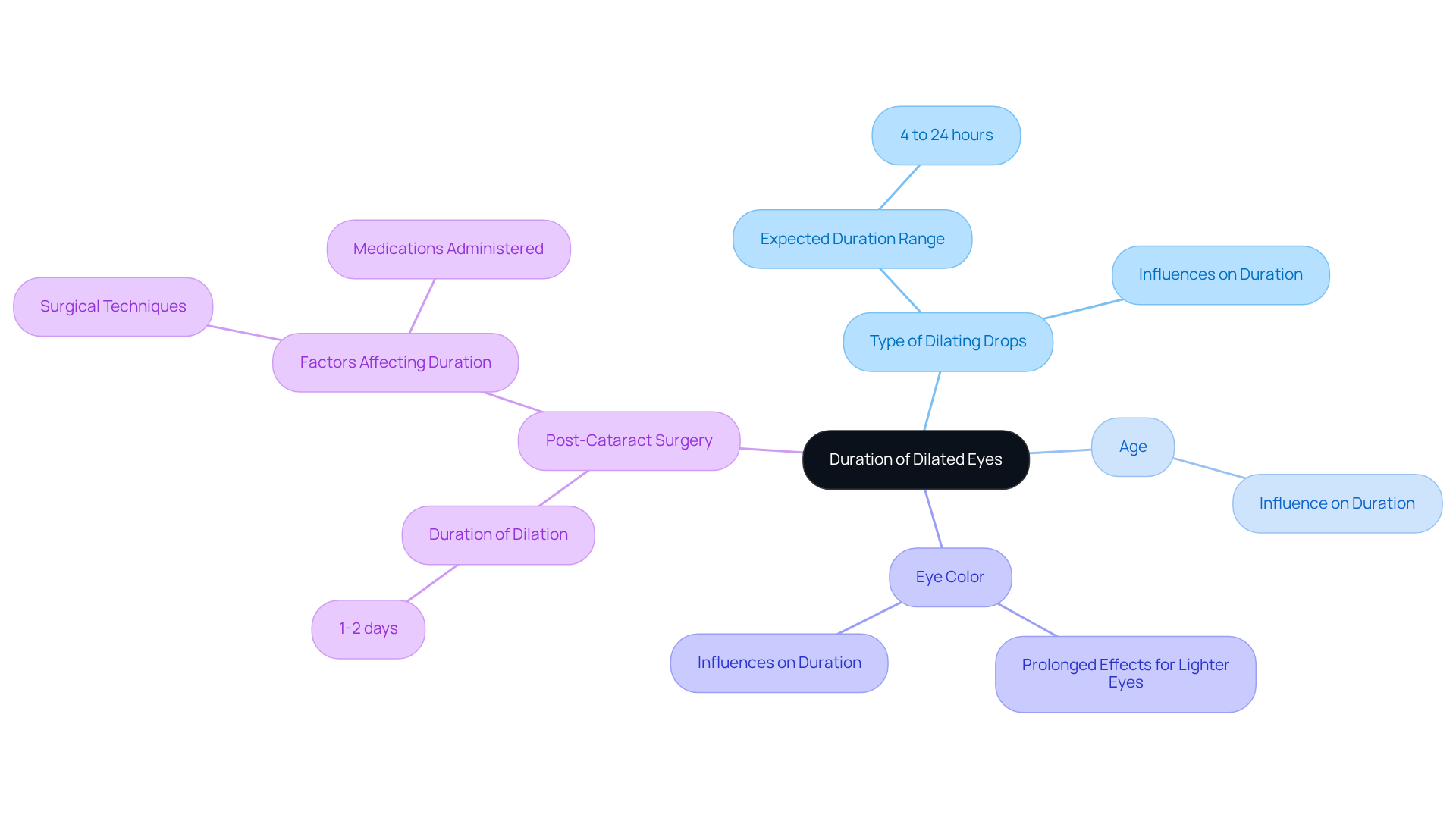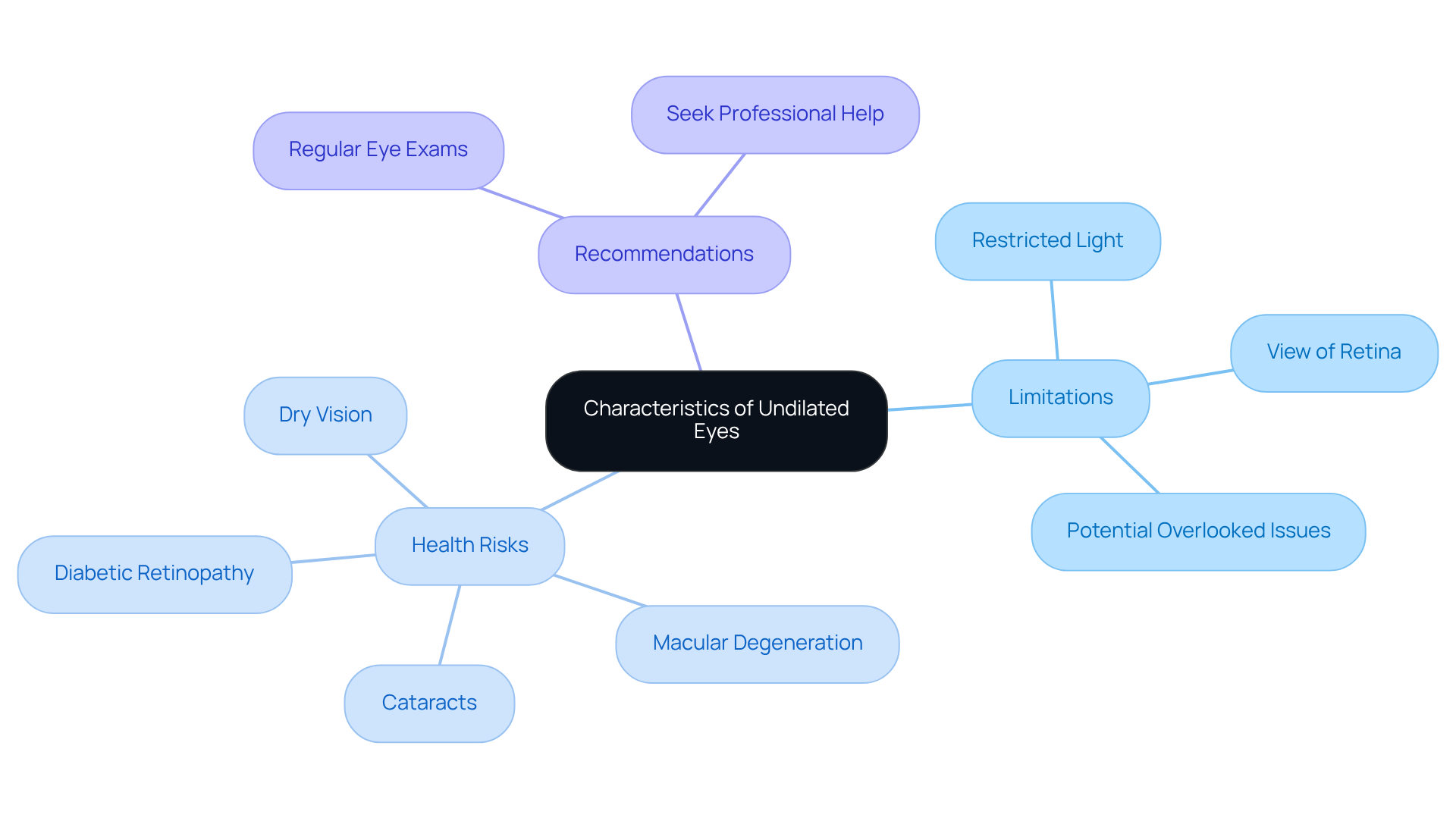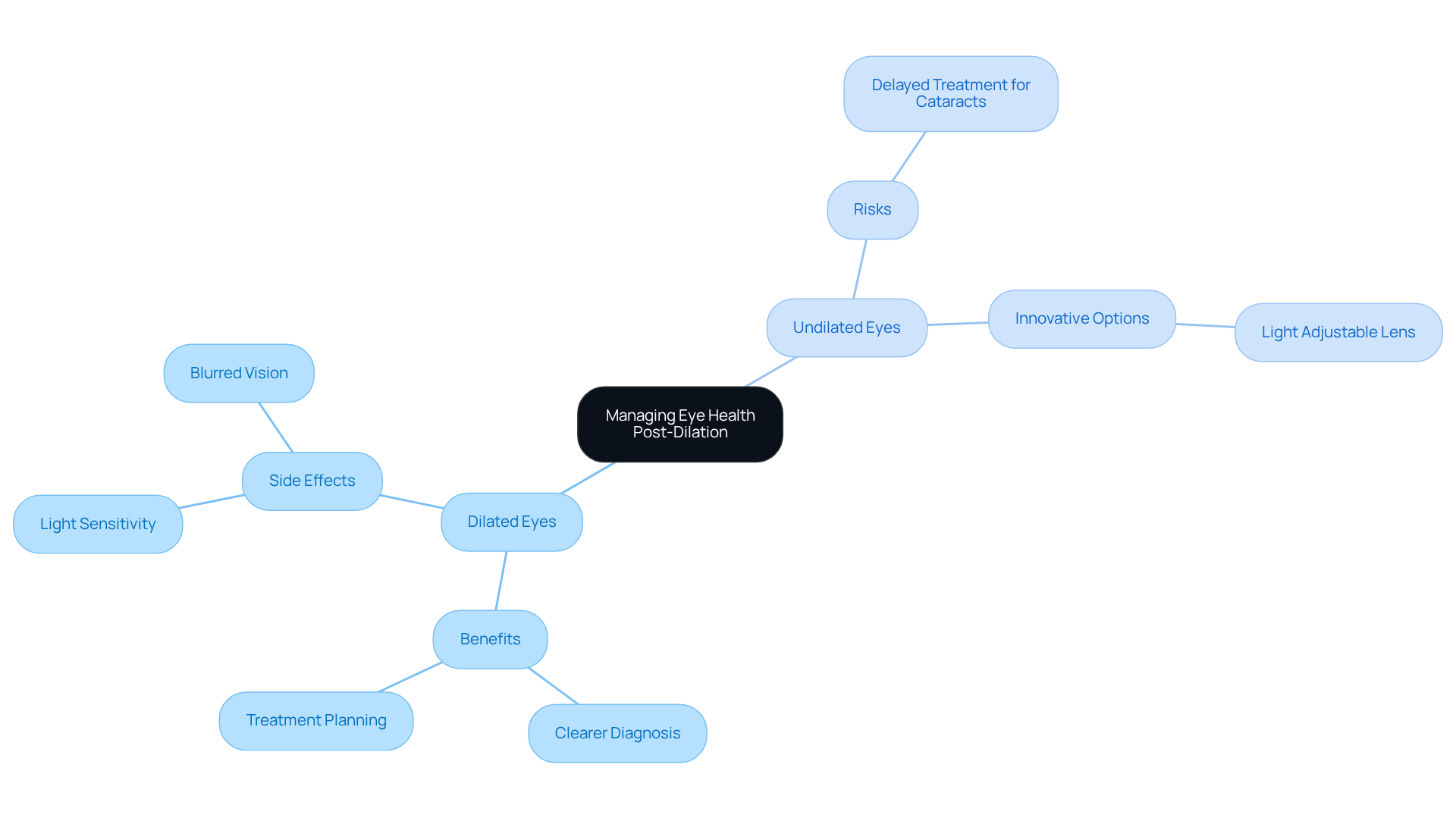Posted by: Northwest Eye in Cataracts, Vision Correction on October 26, 2025
Overview
We understand that experiencing dilated eyes can be concerning. Typically, dilated eyes last between 4 to 24 hours, but this duration can vary based on several factors, including the type of dilating drops used, your age, and even your eye color.
It’s important to note that after cataract surgery, pupils may remain dilated for 1-2 days. We want to emphasize how crucial it is to understand this duration, as it can help manage your expectations and daily activities during your recovery.
Remember, you are not alone in this journey. Many patients share similar experiences and feelings, and we are here to help you through this process. If you have any questions or concerns, please don’t hesitate to reach out for support.
Introduction
Understanding the intricacies of eye dilation is essential, especially for those navigating the complexities of cataract surgery. We understand that this procedure can often be met with apprehension, but it serves a vital purpose in assessing eye health and ensuring effective treatment.
In this article, you will discover the expected duration of dilated eyes, which can be influenced by various factors. We will also discuss the implications of both dilated and undilated states on your overall vision health. It’s common to feel uncertain about how to prepare for the effects of dilation. What steps can you take to manage your eye health effectively during this critical time?
We are here to help you through this process.
Understand Eye Dilation: Purpose and Importance
Eye dilation is a procedure that involves the use of special eye drops to enlarge the pupils. This allows eye care professionals to examine the internal structures of the eye more thoroughly. We understand that this process can feel a bit daunting, but it is especially significant for individuals with lens issues. Dilation enables the surgeon to evaluate the lens and nearby tissues with precision.
It’s common to feel anxious about eye health, but dilation plays a crucial role in identifying multiple eye disorders, such as glaucoma and diabetic retinopathy, which can complicate lens surgery. By understanding the purpose of dilation, you can better appreciate its importance in ensuring optimal surgical outcomes and ongoing eye health management.
At Northwest Eye, we offer innovative solutions, such as the Light Adjustable Lens (LAL). This technology allows for tailored eyesight correction after cataract surgery, providing a customized approach to vision. This not only improves the overall treatment experience but also enhances the results for our patients. We are here to help you through this process, ensuring you feel supported every step of the way.

Duration of Dilated Eyes: Key Factors and Expectations
We understand that many individuals have concerns about how long do dilated eyes last. Typically, how long do dilated eyes last can range from 4 to 24 hours, but this can vary significantly from person to person. Factors that influence this duration include:
- The type of dilating drops used
- Your age
- Your eye color
For instance, those with lighter-colored eyes may experience prolonged dilation effects, which can be unsettling.
After cataract surgery, it’s common for pupils to remain dilated for 1-2 days. This duration can depend on the surgical techniques employed and the specific medications administered. Understanding these factors is crucial as it helps you manage your expectations and plan for any necessary adjustments in your daily routine, especially when considering how long do dilated eyes last.
Remember, it’s completely normal to have questions and concerns during this time. We are here to help you through this process, ensuring you feel supported and informed every step of the way.

Characteristics of Undilated Eyes: Implications for Eye Health
Undilated pupils have constricted openings, which can limit the amount of light entering the eye and restrict the view of the retina and optic nerve. This situation can make it challenging to identify severe issues such as lens opacities, macular degeneration, diabetic retinopathy, and dry vision. We understand that without dilation, eye care specialists may overlook subtle indicators of illness that could lead to considerable loss of sight if not addressed.
For individuals with cataracts, recognizing the implications of undilated eyes reinforces the importance of regular eye exams that include dilation. These exams are crucial for thorough monitoring of eye health. It’s common to feel concerned about symptoms like blurred vision, as they can indicate various eye conditions. This highlights the necessity of seeking professional medical help.
At Northwest Eye, we encourage you to learn about these symptoms and arrange appointments for comprehensive examinations. Unmanaged symptoms can lead to serious health issues, and we are here to help you through this process. Your eye health is important to us, and we want to ensure you receive the care you deserve.

Comparative Summary: Managing Eye Health Post-Dilation
In summary, we understand that managing eye health after dilation is crucial for patients dealing with lens opacity. While dilated pupils provide a clearer perspective for diagnosis and treatment planning, it is essential to know how long do dilated eyes last, as they can also lead to temporary side effects such as light sensitivity and blurred vision. It’s common to feel concerned about impaired sight, as it may indicate underlying conditions like cataracts or other eye diseases that could require treatment. We encourage patients to avoid driving and strenuous activities until they know how long do dilated eyes last and their eyesight returns to normal.
On the other hand, undilated eyes may not reveal these underlying issues, which could delay necessary treatments. We want to reassure you that there are innovative options available, such as the Light Adjustable Lens (LAL), which offers personalized vision correction during cataract surgery, enhancing your overall treatment experience. Therefore, regular dilated eye exams are essential for maintaining optimal eye health and ensuring timely interventions for any emerging conditions. We are here to help you through this process.

Conclusion
Understanding the duration and implications of eye dilation is essential for cataract patients and those undergoing eye examinations. We understand that this process can feel overwhelming, but it is crucial for a comprehensive evaluation of eye health. Regular dilated exams play an important role in detecting potential issues that could lead to significant vision loss. By being aware of how long dilated eyes last, patients can better manage their expectations and alleviate concerns.
This article explores the various factors that influence the duration of dilation, including the type of drops used, age, and eye color. It’s common to feel uncertain about the differences between dilated and undilated eyes. Undilated pupils can obscure critical health indicators, making it harder for your eye care professional to assess your eye health effectively. With advancements like the Light Adjustable Lens offering personalized treatment options, we encourage patients to prioritize their eye health through regular check-ups.
Ultimately, maintaining optimal eye health requires a proactive approach. Understanding the effects of dilation and the importance of timely interventions can empower you. By fostering awareness and encouraging regular eye exams, you can safeguard your vision and well-being. Embracing these practices not only enhances your personal health but also enables you to take charge of your eye care journey.
Frequently Asked Questions
What is eye dilation?
Eye dilation is a procedure that involves the use of special eye drops to enlarge the pupils, allowing eye care professionals to examine the internal structures of the eye more thoroughly.
Why is eye dilation important?
Eye dilation is important because it helps identify multiple eye disorders, such as glaucoma and diabetic retinopathy, which can complicate lens surgery. It allows for a detailed evaluation of the lens and nearby tissues.
Who should consider eye dilation?
Individuals with lens issues or those undergoing lens surgery should consider eye dilation, as it enables a precise evaluation of their eye health.
What technologies are available for vision correction after cataract surgery?
At Northwest Eye, innovative solutions like the Light Adjustable Lens (LAL) are offered, which allows for tailored eyesight correction after cataract surgery.
How does the Light Adjustable Lens (LAL) benefit patients?
The Light Adjustable Lens provides a customized approach to vision correction, improving the overall treatment experience and enhancing surgical results for patients.
What support is available for patients during the eye dilation process?
Northwest Eye offers support to patients throughout the eye dilation process, ensuring they feel supported every step of the way.






